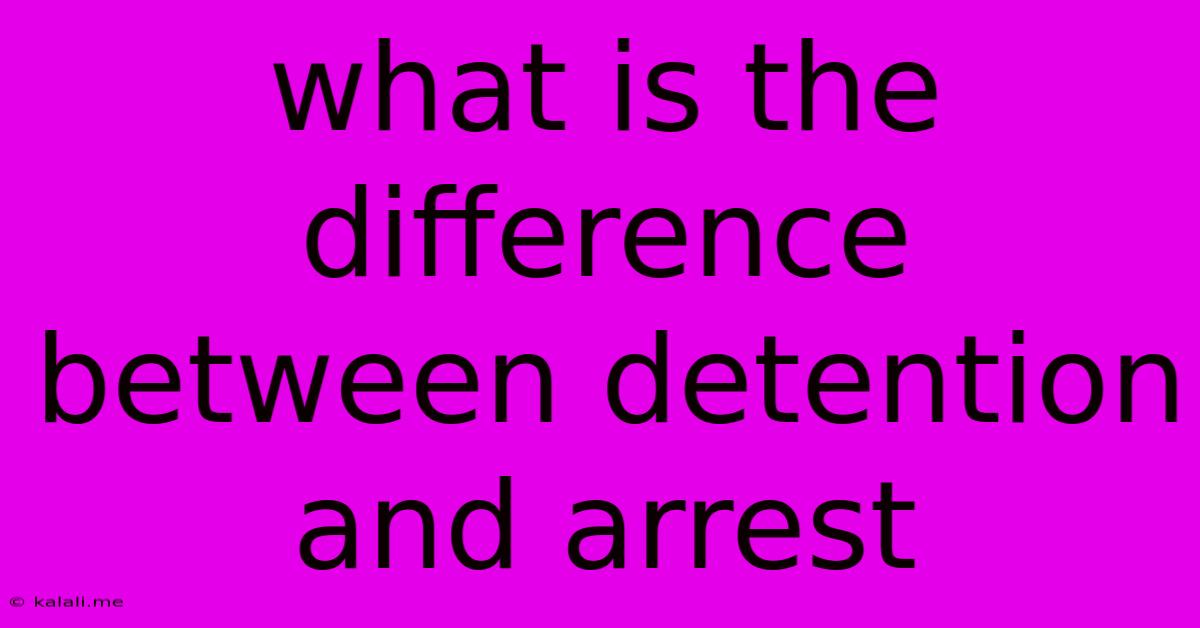What Is The Difference Between Detention And Arrest
Kalali
Jun 15, 2025 · 3 min read

Table of Contents
Detention vs. Arrest: Understanding the Key Differences
Understanding the difference between detention and arrest is crucial, especially if you've ever found yourself involved in a legal situation. While both involve restricting someone's freedom, the legal implications and procedures differ significantly. This article will clarify the distinctions, highlighting the key differences between detention and arrest. This knowledge can help you understand your rights and protect yourself should you ever face either situation.
What is Detention?
Detention is the temporary holding of a person by law enforcement. It's a less formal and less restrictive action compared to arrest. It typically involves a shorter period of time and often occurs for investigative purposes. Think of it as a temporary restriction of movement for questioning or clarification. Key characteristics of detention include:
- Limited Duration: Detention is usually short-lived, lasting only for a reasonable time necessary for investigation.
- No Formal Charges: No formal charges are filed during detention. The individual is not considered officially accused of a crime.
- Right to Leave: While being detained, an individual generally retains the right to leave unless there's a reasonable suspicion that they're involved in a crime.
- Less Restrictive: The level of restriction on movement is significantly less than during an arrest. For example, an individual might be asked to stay in a waiting area while officers gather information.
- Examples: A police officer briefly detaining a person for questioning after witnessing suspicious behavior; airport security personnel detaining a passenger for further screening.
What is Arrest?
An arrest, on the other hand, is a much more formal and serious action. It's the taking of a person into custody by law enforcement based on probable cause that they have committed a crime. This action significantly restricts an individual's freedom and carries significant legal consequences. Key characteristics of an arrest include:
- Formal Charges: An arrest typically leads to formal charges being filed against the individual.
- Probable Cause Requirement: Law enforcement must have probable cause, meaning reasonable grounds to believe a crime has been committed and the individual committed it, to make an arrest.
- Significant Restrictions: An individual's freedom of movement is substantially restricted. They may be handcuffed, searched, and taken to a police station.
- Miranda Rights: In many jurisdictions, upon arrest, individuals are informed of their Miranda rights (the right to remain silent, the right to an attorney, etc.).
- Booking Process: Following an arrest, the individual undergoes a booking process, which includes fingerprinting, photographing, and recording personal information.
- Examples: Arrest for shoplifting, arrest for driving under the influence (DUI), arrest for assault.
Key Differences Summarized:
| Feature | Detention | Arrest |
|---|---|---|
| Formality | Informal | Formal |
| Probable Cause | Not required | Required |
| Charges | No formal charges | Formal charges typically filed |
| Duration | Short, temporary | Can be extended, depending on legal process |
| Restrictions | Minimal restriction of movement | Significant restriction of movement |
| Miranda Rights | Not typically read | Typically read upon arrest |
When to Seek Legal Counsel:
If you are detained or arrested, it's crucial to understand your rights. Seeking legal counsel immediately is highly recommended, particularly if you are facing arrest and formal charges. An attorney can help you navigate the legal process, protect your rights, and ensure you receive a fair outcome. Understanding the difference between detention and arrest is a critical first step in protecting yourself.
Latest Posts
Latest Posts
-
Which Game Was Invented In India
Jun 15, 2025
-
Which Of The Following Is A First Class Lever
Jun 15, 2025
-
The Atomic Mass Number Is Equal To
Jun 15, 2025
-
Polar Moment Of Inertia Of Square
Jun 15, 2025
-
Which Of The Following Represents A Quantitative Research Design
Jun 15, 2025
Related Post
Thank you for visiting our website which covers about What Is The Difference Between Detention And Arrest . We hope the information provided has been useful to you. Feel free to contact us if you have any questions or need further assistance. See you next time and don't miss to bookmark.